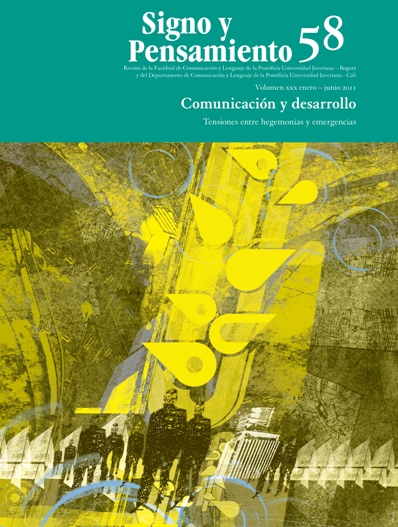Abstract
This paper inquires into certain theoretical lines of argument in order to rethink the analyses of some alternative communication projects under way in different Argentine inland cities. The characteristics of some established radio and digital newspapers, produced by young men and women from urban milieus, problematize the ways in which social, political, and discursive matters are to be approached. Thus, in this paper, we propose a dialogue between the different post-structuralist perspectives in order to ponder on the relationships established between power and resistance based on a ‘rhizomatic’ conception of the social issue. On the other hand, we recover some Latin American reflections on alternative communication in order to connect them to M. Foucault’s proposal concerning the indissoluble link between power and discourse.
Arditi, B. (1991), “La totalidad como archipiélago. El diagrama de los puntos nodales”, en Arditi, B. (coord.), Conceptos. Ensayos sobre teoría política, democracia y filosofía, Asunción, CDE-RP Ediciones, pp. 103-124.
— (1986), “Una gramática posmoderna para pensar lo social”, Zona Abierta, núms. 41-42, pp. 183-206.
Bitonte, M. (2008), “La sociosemiótica como forma de pensamiento crítico. De la teoría al trabajo sobre configuraciones materiales”, en Perspectivas de la Comunicación, vol. 1, núm. 2, Universidad de la Frontera.
Certeau, Michel de (1994), La invención de lo cotidiano. Artes de hacer, México, UIA/Iteso, 1995.
Deleuze, G. (1978), “Nomad Thought”, Social Text(e), vol. 3, núm. 1, pp. 12-21.
Fink, E. (1976), La filosofía de Nietzsche, Madrid, Alianza Editorial.
Foucault, M. (1984, octubre), “De los espacios otros” [conferencia], Cercle des Études Architecturals [Lima, marzo de 1967], en Architecture, Mouvement, Continuité, núm. 5.
— (1992), Microfísica del poder, Madrid, La Piqueta.
— (1973), El orden del discurso, Barcelona, Tusquets.
Laclau, E. (1993), “La imposibilidad de la sociedad”, Nuevas reflexiones sobre la revolución de nuestro tiempo, Buenos Aires, Nueva Visión.
Mangone, C. (2005), “Qué hay de nuevo viejo, alternatividad y clases sociales. Los modos de la moda en la teoría social. Diez propuestas” [ponencia], Buenos Aires, Universidad de Buenos Aires.
Mata, M. C. (1994), “Nociones para pensar la comunicación y la cultura masiva”, Buenos Aires, La Crujía.
Simpson Grimberg, M. (comp.) (1981), Comunicación alternativa y cambio social I. América Latina, México, UNAM.
Verón, E. (1984), “Construir el acontecimiento”, Espacios de Crítica y Producción, Secretaría de Bienestar Estudiantil y Extensión Universitaria de la Universidad de Buenos Aires.
Verón, E. y Sigal, S. (2003), Perón o muerte. Los fundamentos discursivos del fenómeno peronista, Buenos Aires, EUDEBA.
This journal is registered under a Creative Commons Attribution 4.0 International Public License. Thus, this work may be reproduced, distributed, and publicly shared in digital format, as long as the names of the authors and Pontificia Universidad Javeriana are acknowledged. Others are allowed to quote, adapt, transform, auto-archive, republish, and create based on this material, for any purpose (even commercial ones), provided the authorship is duly acknowledged, a link to the original work is provided, and it is specified if changes have been made. Pontificia Universidad Javeriana does not hold the rights of published works and the authors are solely responsible for the contents of their works; they keep the moral, intellectual, privacy, and publicity rights.
Approving the intervention of the work (review, copy-editing, translation, layout) and the following outreach, are granted through an use license and not through an assignment of rights. This means the journal and Pontificia Universidad Javeriana cannot be held responsible for any ethical malpractice by the authors. As a consequence of the protection granted by the use license, the journal is not required to publish recantations or modify information already published, unless the errata stems from the editorial management process. Publishing contents in this journal does not generate royalties for contributors.


